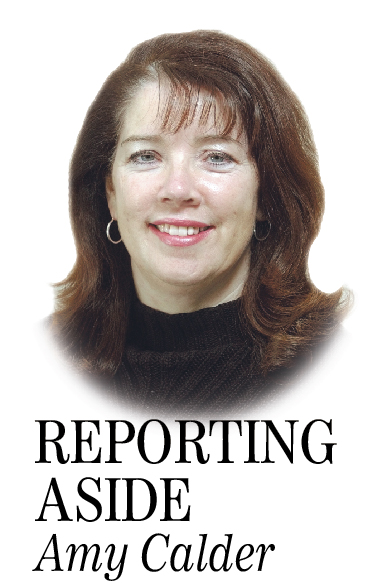These cool, crisp mornings, as school buses rumble along the roads, I feel a twinge of nostalgia for all the years I rode the bus to and from school in Skowhegan.
For me, the bus was as much a part of my life as school itself. In fact, I still dream about being perched in those old green seats, lurching to and fro as we bounced across bridges, sailed past farmhouses and hayfields, and ground through the downtown, windows open in spring and fall, the smell of diesel wafting in.
In winter, with windows frozen shut, we pressed noses against the glass, peering out, rubbing away the window fog with wet mittens. On hot days in spring and fall, we wrenched them open to keep from suffocating.
The bus was a place we could engage in conversation or turn away and watch the world go by. It also was a gold mine for curious kids like me who loved to watch people and listen to them talk.
The first day of school meant getting to inspect everyone’s new attire — the sophisticated high school girls with their mini skirts, go-go boots, red lipstick and hair wrapped up in bee hives, boys in pressed shirts and trousers, we younger girls in jumpers, ankle socks and patent leather shoes. We sported new pencil cases, those rectangular pouches that came in various colors and zipped shut, filled with newly sharpened colored pencils, erasers and yellow No. 2s. We also lugged spiral notebooks and, of course, brown paper bags containing our cold lunches.
There were the poor kids, whose rumpled clothes were hand-me-downs or those left over from last year, and I felt sorry for them. Their shoes were worn and scuffed, and I don’t know if they ever got to eat lunch, now that I think of it.
The older girls talked about boys; the boys talked about girls.
I remember our bus passing the home of a high school science teacher whose pretty wife was outside in a chaise lounge, sunbathing in a two-piece suit. One boy said that’s why the teacher always came to school looking tired, prompting laughter from his friends. I was too young to understand what they meant but figured it out much later.
The bus was where we gossiped, got the scoop, laid plans and learned about life.
One day my friend who grew up on a farm informed me about the facts of life as we sat in the second row behind the bus driver. I thought her theory strange and didn’t believe it.
On the school bus Nov. 22, 1963, we first learned about tragedy. President John F. Kennedy had been assassinated in Dallas and schools closed early. We kids were sent home on the bus, though I did not really grasp the meaning of what was happening until we picked up the older kids at the high school and they were all discussing it. I remember exactly where we were when the reality of it hit me: in the high school parking lot heading toward Main Street. Some of the kids were crying.
Also on the bus I had my last conversation with a longtime childhood friend, Dicky, who drowned in the Kennebec River shortly thereafter.
Dicky lived a few houses around the corner from us and took part in our daily adventures, from fishing in the Wesserunsett Stream that ran through the woods behind his house to building snow forts and tunnels, tree houses and cabins in the woods. One summer, we constructed several enormous teepees from piles of boards a logging company had discarded and left in a nearby field. Our project was so unusual, the local newspaper came and took a photo of us, sitting near the teepees, cross-legged and looking very proud.
Right before Dicky was swallowed up by the river one Saturday morning in spring, we had a lively discussion on the bus about all the crazy fun we had as little kids.
We were in seventh grade and sitting in the back of the bus, he in one seat and I in the next, talking a mile a minute, telling stories. Dicky and I had the love of stories and laughter in common and the more we pontificated, the more animated and louder we got. I remember his cheeks were as red as the army jacket he loved to wear, his dark brown hair framing a joyful face I shall never forget.
It was the last time I saw Dicky, and a memory I hold dear nearly a half-century after his death.
We never thought much about the bus drivers all those years and took for granted they would always be there. Some were characters and talked a lot while others barely said a word, but they knew all of us by name and exactly where we lived, and were never late in picking us up.
I heard on the news the other day that school bus drivers are in such great demand across the country that they’re recruiting military veterans to do the work. Times change and so do we.
But what will not fade are memories of riding that bus — and they become particularly vivid around Labor Day which, in our youth, marked the last day of summer freedom.
Even that has changed, as kids now return to school a week earlier — and some adults think they should go year-round.
What? No summer vacation? I can’t imagine it. But that’s a topic for another day.
Amy Calder has been a Morning Sentinel reporter for 29 years. Her column appears here Mondays. She may be reached at acalder@centralmaine.com. For previous Reporting Aside columns, go to centralmaine.com.
Send questions/comments to the editors.


